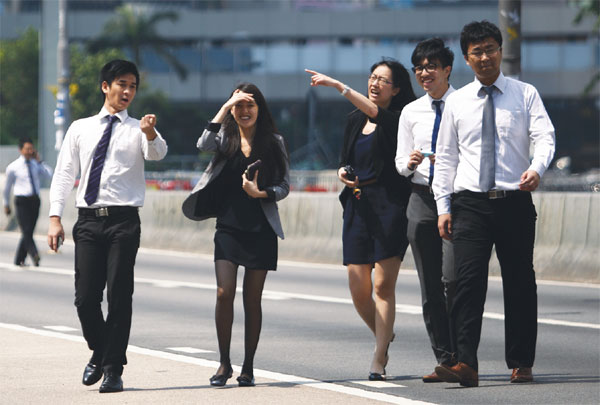Throwing down the gauntlet
Updated: 2015-04-02 07:30
By Felix Gao in Hong Kong(HK Edition)
|
|||||||
|
Hong Kong is attractive to international talent due to its close links with the massive mainland market, a distinct asset of the SAR. Tomohiro Ohsumi / Bloomberg |
Editor's note: Hong Kong has gone the extra mile to retain its competitive edge in the Asia Pacific as it faces a mounting threat from regional economies in attracting top talent and professionals from around the world. Industry experts are confident that Hong Kong can stand up to the challenge with its unique advantages.
Hong Kong is renowned as a competitive place for talented professionals from around the globe. Its excellent location, a high income level, a low tax environment and a diversified culture have made the SAR a talent hub in the Asia Pacific region, and are key factors in making the city tick and helping to ward off potential threats.
But, it's facing a growing challenge from other economies in the region, aggravated by the city's soaring costs of living and a dearth of innovation.
A recent report by professional services company Towers Watson points to the narrowing pay gap between top corporate executives on the mainland and in Hong Kong.
Hong Kong currently pays the second-highest basic salaries for senior and top management personnel in the Asia Pacific region, with executives in the top rung earning an average of $445,000 annually, against $586,000 in Singapore. Senior management executives in Shanghai make only 10 percent less than that of their peers in Hong Kong.
Amid a rapidly rising economy, the mainland now offers more job opportunities with higher pay, triggering a "going north" trend among talented professionals.
"Hospitality, as a professional career option on the mainland, is still relatively new, resulting in a lack of qualified people to meet increasing demand for senior staff in luxury hotels. Among some 1,600 new hotels that opened last year on the mainland, more than 100,000 middle or senior management posts went unfulfilled," said Dundy Deng, director of human resources of Niccolo Chengdu Hotel.

Bird Kei Wai-fai, executive chef at Yue Hin Restaurant at Niccolo Chengdu, chose to relocate to the mainland from Hong Kong's Marco Polo Hotel. "The mainland market is bigger than Hong Kong's as there are more existing or emerging restaurants and hotels there. But, the same industry in Hong Kong is relatively saturated," he said.
To keep itself attractiveness, Hong Kong has taken a more proactive approach in recruiting talent and professionals. The government is trying to attract Hong Kong's second-generation, permanent residents who have emigrated overseas to return, and encourage talent and entrepreneurs from the mainland and overseas to come and stay in Hong Kong by relaxing visa requirements.
Jesse Lui, human resources development manager at Cathay Pacific Airways Ltd, said the SAR's pay level is still very competitive in the Asia Pacific and it's not difficult to hire professionals from abroad.
According to the Census and Statistics Department, the median monthly wage of employees in Hong Kong up to June last year stood at HK$14,800, while Shanghai offers the highest monthly wage on the mainland, with employees earning an average of 5,036 yuan ($811) monthly by the end of 2013.
But, Hong Kong's favorable tax environment has boosted employees' take-home pay. They now enjoy a low standard salaries tax rate of 15 percent and a basic allowance of HK$120,000 a year.
Many other global economies, including the European Union, Singapore and South Korea, have cut their profit and salaries tax in recent years.
The government further proposed a 75-percent reduction in salaries tax in the 2015-16 Budget to maintain the tax advantage.
However, Hong Kong's high cost of living is a big setback. The city has been ranked among the 10 most expensive cities in the world to live in for the first time since 2003, according to a survey by the Economist Intelligence Unit. Hong Kong took the ninth spot on the list - the second-highest in Asia and higher than Seoul and Tokyo.
"The biggest obstacle is definitely rocketing property prices," Lui said. "Many professionals used to live in a big house with a big garden in their home countries. But, when they come to work in Hong Kong, they are squeezed into a tiny flat and have to pay outrageous rents."
A survey on housing affordability released by Demographia ranked Hong Kong as the least affordable major market for the fifth consecutive year. The SAR's median housing price is 17 times the median household income, the highest affordability ratio ever recorded. In the third quarter of last year, 48 percent of homes were sold for well above HK$5 million each.
The government has taken steps to stabilize the property market. It's planning to build more flats in the Northeast New Territories' new development areas to increase housing supply. It has also required banks to lower the maximum loan-to-value ratio to 60 percent for self-use residential properties priced at below HK$7 million in order to curb speculation.
Standard & Poor's analysts estimate that the property sales volume in Hong Kong would drop by 10 to 15 percent, while prices would decline by up to 5 percent by the end of the year.
Moreover, although Hong Kong boasts world-class universities, higher education facilities and innovation still need to be improved to raise its competitiveness.
"The quality of Hong Kong's research institutions and the limited availability of scientists and engineers remain the two key issues to be addressed," said the Global Competitiveness Report 2014-2015.
Hong Kong ranked 26th in the report's innovation rankings, down three places from a year earlier, while its quality of research institutions ranking was one place lower at 32nd. The ranking for availability of scientists and engineers fell four spots to 36th.
The government has launched a series of initiatives to broaden the opportunities for local students to receive higher education. In the 2015 Policy Address, the government proposed injecting HK$5 billion into the Innovation and Technology Fund. It also plans to invest more than HK$850 million to set up an Innovation and Technology Bureau.
Lui is adamant that Hong Kong still has its unique advantages in attracting talent. "Hong Kong is regarded as a hub in Asia. It's a place that's very convenient to travel around. Hong Kong and Singapore are the top choices of many people when they start to work in Asia, followed by Shanghai and Beijing," he said.
Peter Yu, general manager of human resources service firm Randstad Hong Kong Ltd, said:"Hong Kong is a great regional location. It is situated in the middle of some emerging countries, including Thailand, the Philippines and Malaysia. It's still seen as a good base location. All organizations are still looking to come to Hong Kong."
Lui said a culture combined with Eastern and Western elements also makes Hong Kong more attractive to top talent. "Hong Kong offers a vibrant nightlife. The high penetration of English helps foreign employees to adapt to life here. Hong Kong and Singapore are the most expatriate friendly places in Asia."
The SAR's close links with the mainland is another distinct asset. "Some foreign employees see Hong Kong as their first stop, as the stepping stone in Asia. They will try to adapt to the environment here before considering whether to embark on a career on the mainland," Lui said.
felix@chinadailyhk.com
(HK Edition 04/02/2015 page9)
